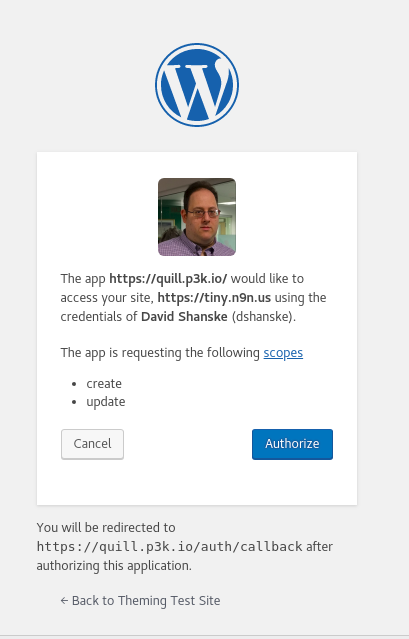Year: 2018
Map
Part of this is an opportunity to improve audio post presentation on my website, so you will see audio posts improve over time.
Working on Integrations
I am trying to decide how far I want to go. For example, in addition to actual coordinates, I have a property for my location that allows for the following options: At Home, Just Left Home, At Work, Just Left Work, Just Arrived Home, Away, and Extended Away. do I want to actually identify where I am, either with granular or general location just because I can? Or do I just want to add context to a post when I’m saying something else.
There are lots of other integrations I’m looking to do, for various reasons. There is a lot of data I’d like to store in my site that you won’t be able to see, for historic and future purposes.
This is a problem people may have solved on other sites, but I’m trying to solve it for myself. Especially since anything I post on my site is syndicated elsewhere.
IndieAuth for WordPress
IndieAuth is a layer on top of OAuth 2.0, a standard that grants websites or applications access to their information on other websites but without providing passwords.
OAuth is already being used by a variety of services…Login with Facebook or Login with Google options on sites are usually OAuth based. The difference is that for IndieAuth, users and clients are all represented by URLs.

So, why did I want to build one? A few reasons. The most popular use for a IndieAuth server as authentication for Micropub clients. Micropub is a standard for creating posts using third-party clients.
WordPress is moving toward deprecating their post interface in favor of a totally new one called ‘Gutenberg’. As a long time WordPress user, the focus on this concerns me as it does not necessarily represent my needs or desires as a user of the platform. So, I want to have options.
Currently, OAuth servers for WordPress of all types are limited. The REST API, which was heralded with much optimism, lacks an OAuth authentication method. In fact, it lacks any built-in authentication options other than the WordPress login for external authentication.
There is an incomplete project for an OAuth2 server for WordPress I did get some useful ideas from, however. I also have to thank Aaron Parecki, who wrote a book on OAuth2 and wrote the Indieauth specification, for reviewing my work and giving lots of feedback.
What I’ve built, with help, is a working IndieAuth authentication method that works for the REST API, among other things.
Since I wanted this to be widely adoptable, I needed to make sure of a secure implementation, and I think the results are a good initial version. There is an opportunity for further refinements and improvements, but it means that WordPress users are no longer dependent on Indieauth.com, the reference implementation of the spec which uses OAuth providers like Github and Twitter to authenticate.
This leads to my hopes for the future. There are people working on Micropub clients for Android. And if any of them pans out, or my own mobile options, I could easily post notes to my site from wherever I am using tools that are much more flexible to my needs than are available now, the culmination of nearly 4 years of moving toward this point, on and off.
The success for me will be able to read something on my phone, and quickly share that to my site. Or have a thought and quickly share it to my site, without having to spend so much time setting it up I think better of it.
There are still pieces that need work to achieve that, but this is a major piece knocked off.
Show Notes
The originating articles that kicked off the Facebook/Cambridge Analytica issue:
- 3/16/18: Facebook’s Newsroom: Suspending Cambridge Analytica and SCL Group from Facebook by Paul Grewal Protecting people’s information is at the heart of everything we do.
- 3/17/18: The Guardian: Revealed: 50 million Facebook profiles harvested for Cambridge Analytica in major data breach https://www.theguardian.com/news/2018/mar/17/cambridge-analytica-facebook-influence-us-election
- 3/17/18: New York Times: “How Trump Consultants Exploited the Facebook data of Millions”: https://www.nytimes.com/2018/03/17/us/politics/cambridge-analytica-trump-campaign.html
Other related articles:
- Anil Dash: Article bringing the Facebook issue back around to regaining the good parts of the “old” web” https://medium.com/@anildash/the-missing-building-blocks-of-the-web-3fa490ae5cbc
- How To Change Your Facebook Settings To Opt Out of Platform API Sharing (Electronic Frontier Foundation) https://www.eff.org/deeplinks/2018/03/how-change-your-facebook-settings-opt-out-platform-api-sharing
- 3/24/18: Ars Technica: Facebook scraped call, text message data for years from Android phones
Recent Documented Facebook Quitters:
Jonathan LaCour: https://cleverdevil.io/2018/ive-officially-deleted-my-facebook-account-and
Eddie Hinkle: https://eddiehinkle.com/2018/03/22/5/article/
Natalie Wolchover: https://twitter.com/nattyover/status/975711260221362177
New York Times Profile of multiple quitters: https://www.nytimes.com/2018/03/21/technology/users-abandon-facebook.html
IndieWeb Wiki related pages of interest here:
- https://indieweb.org/why
- https://indieweb.org/principles
- https://indieweb.org/Facebook
- https://indieweb.org/silo-quits
- https://github.com/tootsuite/mastodon/issues/6074
Potential simple places to move to when leaving Facebook
- Micro.blog for $5/month (or bring your own web site for free)
- Mastodon
- WordPress.com
- Tumblr.com
- WithKnown (Paid service or host your own)
- WordPress.org (self-hosted or managed)
- Other possible projects/options: https://indieweb.org/projects
Sebastian Greger’s Privacy policy: https://sebastiangreger.net/privacy-policy/
Mastodon not supporting Webmention specification: https://github.com/tootsuite/mastodon/issues/6074#issuecomment-378452136
